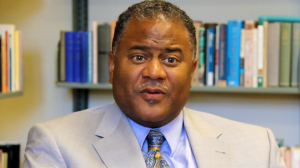Rev. Dr. Rodney Sadler appears in the Many Voices Video Campaign, a visibility platform that illuminates the powerful presence of Black lesbian, gay, bisexual, and transgender Christians and allies within the Black church. Watch and share his video here.
 Every human being reflects a part of God. God’s divinity is impressed upon our being, regardless of our race, creed, gender, sexual orientation, or ability and that invests us all with value.
Every human being reflects a part of God. God’s divinity is impressed upon our being, regardless of our race, creed, gender, sexual orientation, or ability and that invests us all with value.
If we are all created in God’s image, we should all be equally valued. That means we as a church need to affirm all of God’s children.
In every page of Scripture, God is talking about social justice, reminding us that the way we treat those we least regard is how we’re treating God’s self. It’s that simple.
In every page of Scripture, God is talking about social justice, reminding us that the way we treat those we least regard is how we’re treating God’s self. It’s that simple.
As a biblical scholar and ordained pastor, I work with Moral Mondays, weekly NAACP-led demonstrations in Raleigh, NC. I’m also fighting for Medicaid expansion, engaged in efforts for Mid-East peace, and combating homelessness in the city. In addition, I work with pastors in North Carolina to help create more welcoming and lesbian, gay, bisexual, and transgender (LGBT) affirming Black churches.
LGBT justice is truly one of the most significant contemporary civil rights struggles and very much a part of our work as African Americans. Our ideological opponents have attempted to drive a wedge between African American clergy and the LGBT community. We must realize that we are in a common struggle and that by coming together we have much more strength.
When we went through the Amendment One fight—which defined marriage as between one man and one woman and banned any other types of domestic unions—I realized the collective power that we have in North Carolina and why some would like to divide the alliance of African American clergy and LGBT advocates.
The reality is that division only serves our ideological opponents. If we can see this, maybe we’ll be more willing to band together across our differences.
As a rule, people tend to demonize the “sins” that they don’t commit. So we heterosexual Christians are not concerned about eating shellfish, wearing clothing of mixed fabrics or eating pork though these acts are condemned in the same legal corpus that decries same-sex acts. There’s a bit of hypocrisy there.
The thing that sets heterosexual people at odds with the LGBT community is not the Scriptures themselves; it’s our interpretation of these Scriptures through the lenses of our own prejudices that exacerbates the division.
The thing that sets heterosexual people at odds with the LGBT community is not the Scriptures themselves; it’s our interpretation of these Scriptures through the lenses of our own prejudices that exacerbates the division.
It’s important to understand the Biblical texts in light of their cultural contexts. At the end of the day, we should spend more time focusing on ourselves and what God wants us to work on—and less time demonizing one another. We can’t make ourselves the judges empowered by ourselves to determine what is right for someone else.
I hope that by my being visible in the Many Voices Video Campaign, people will go back and rethink the way that they see Scripture. I want them to find for themselves that there’s a way to read our sacred texts that will enable them to be open to manifesting God’s love towards our LGBT brothers and sisters.
Rev. Dr. Rodney Sadler is an Associate Professor of Bible at Union Presbyterian Seminary. Sadler’s teaching experience includes courses in biblical languages, Old and New Testament interpretation, wisdom literature in the Bible, the history and religion of ancient Israel, and African American biblical interpretation.